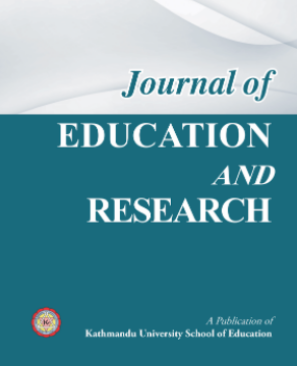
Realizing the Existence of Multiple Forms of Knowledge: A Strategy Towards Seeing Education for Rural Transformation
Original Article
Journal of Education and Research, Volume 4, Issue 2, 2014, 102-117, https://doi.org/10.51474/jer.v4i2.117
Publication date: Aug 15, 2014
Views: 522 | Downloads: 272
How to cite this article
APA
In-text citation: (Parajuli, 2014)
Reference: Parajuli, M. N. (2014). Realizing the Existence of Multiple Forms of Knowledge: A Strategy Towards Seeing Education for Rural Transformation. Journal of Education and Research, 4(2), 102-117. https://doi.org/10.51474/jer.v4i2.117
Reference: Parajuli, M. N. (2014). Realizing the Existence of Multiple Forms of Knowledge: A Strategy Towards Seeing Education for Rural Transformation. Journal of Education and Research, 4(2), 102-117. https://doi.org/10.51474/jer.v4i2.117
Vancouver
In-text citation: (1), (2), (3), etc.
Reference: Parajuli MN. Realizing the Existence of Multiple Forms of Knowledge: A Strategy Towards Seeing Education for Rural Transformation. Journal of Education and Research. 2014;4(2):102-17. https://doi.org/10.51474/jer.v4i2.117
Reference: Parajuli MN. Realizing the Existence of Multiple Forms of Knowledge: A Strategy Towards Seeing Education for Rural Transformation. Journal of Education and Research. 2014;4(2):102-17. https://doi.org/10.51474/jer.v4i2.117
AMA
In-text citation: (1), (2), (3), etc.
Reference: Parajuli MN. Realizing the Existence of Multiple Forms of Knowledge: A Strategy Towards Seeing Education for Rural Transformation. Journal of Education and Research. 2014;4(2), 102-117. https://doi.org/10.51474/jer.v4i2.117
Reference: Parajuli MN. Realizing the Existence of Multiple Forms of Knowledge: A Strategy Towards Seeing Education for Rural Transformation. Journal of Education and Research. 2014;4(2), 102-117. https://doi.org/10.51474/jer.v4i2.117
Chicago
In-text citation: (Parajuli, 2014)
Reference: Parajuli, Mahesh Nath. "Realizing the Existence of Multiple Forms of Knowledge: A Strategy Towards Seeing Education for Rural Transformation". Journal of Education and Research 2014 4 no. 2 (2014): 102-117. https://doi.org/10.51474/jer.v4i2.117
Reference: Parajuli, Mahesh Nath. "Realizing the Existence of Multiple Forms of Knowledge: A Strategy Towards Seeing Education for Rural Transformation". Journal of Education and Research 2014 4 no. 2 (2014): 102-117. https://doi.org/10.51474/jer.v4i2.117
Harvard
In-text citation: (Parajuli, 2014)
Reference: Parajuli, M. N. (2014). Realizing the Existence of Multiple Forms of Knowledge: A Strategy Towards Seeing Education for Rural Transformation. Journal of Education and Research, 4(2), pp. 102-117. https://doi.org/10.51474/jer.v4i2.117
Reference: Parajuli, M. N. (2014). Realizing the Existence of Multiple Forms of Knowledge: A Strategy Towards Seeing Education for Rural Transformation. Journal of Education and Research, 4(2), pp. 102-117. https://doi.org/10.51474/jer.v4i2.117
MLA
In-text citation: (Parajuli, 2014)
Reference: Parajuli, Mahesh Nath "Realizing the Existence of Multiple Forms of Knowledge: A Strategy Towards Seeing Education for Rural Transformation". Journal of Education and Research, vol. 4, no. 2, 2014, pp. 102-117. https://doi.org/10.51474/jer.v4i2.117
Reference: Parajuli, Mahesh Nath "Realizing the Existence of Multiple Forms of Knowledge: A Strategy Towards Seeing Education for Rural Transformation". Journal of Education and Research, vol. 4, no. 2, 2014, pp. 102-117. https://doi.org/10.51474/jer.v4i2.117
ABSTRACT
Education in Nepal is very structured and focused towards enhancing cognitive knowledge of students. Though Nepali policy documents often emphasize education as a means for development and social transformation, this paper argues that Nepali education has not given any direct consideration to this aspect. Some attempts are of course made towards seeing education as a means for rural transformation but it is a surprising reality that despite success of those pioneer and model building efforts, they could not be placed in government policy and practice. Deriving from those and other research and field experiences, the paper tries to explain this reality. Further, based on such Nepali experience, the paper argues on the need for identifying local practices of knowing and educating as accepted modes of knowing and educating. Such recognition would contribute to see the knowing beyond the formal and non-formal schooling process. This would help us realize that forms of knowledge are not one but multiple. In today's globalized context, it is of course important that people have knowledge that could link them with the world beyond their everyday living. At the same time, it is also equally important that we value their knowing and educating practices and recognize all forms of knowledge as important and end the binary and derogatory practice of labeling people as illiterate as we have given to the large mass of people.
REFERENCES
---
LICENSE
This work is licensed under a Creative Commons Attribution 4.0 International License.
